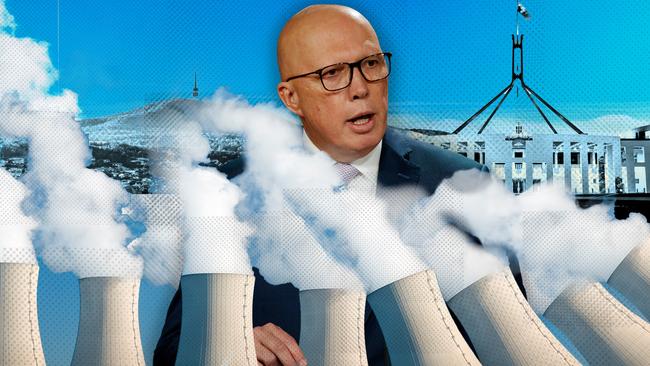
Where possible and at every opportunity, Labor’s leaders are seeking to combine a common theme of “risk” for both attacks, and there is no sense that Richard Marles, Jim Chalmers or Tanya Plibersek – in Anthony Albanese’s absence – feel that the “risk” can be overstated.
Having thought for too long the Liberal leader was unelectable, the ALP has woken up to evidence in polling that he is closing in on the Prime Minister and the Coalition is overtaking the government.
The Treasurer started the first sitting day of the last session squeezing in claims at every chance that Dutton was “risky, reckless and arrogant” – in one interview mentioning “reckless arrogance” four times in just two sentences.
Housing Minister Clare O’Neil went one further in parliament, declaring Dutton’s “nasty negativity and reckless arrogance” would be a threat if he “becomes leader of our country”.
Marles, as Acting PM, attacked both Dutton and the Coalition’s nuclear policy as risky, repeatedly declaring nuclear energy was “the single most expensive form of electricity which exists in the world today”.
“Which is why the biggest risk to the household budgets of every Australian is the prospect of a future Dutton government,” he said.
The Environment Minister blamed the previous Coalition for the need to prolong coal-fired power stations for 20 years and attacked the opposition for “the fantasy of nuclear energy”.
Expect to hear much more of the same from Labor over the next two weeks and into next year – yet these arguments are not without risk.
For a start, the obsession with Dutton personally and the use of the term “Dutton government” and “if he becomes prime minister” elevates the Opposition Leader to the same level as Albanese and concedes a danger they now see of a possible election loss. They may be denigrating Dutton but they are telling the public they fear his leadership and think he can win.
The grounds for attack on the nuclear energy policy also concede ground and limit the arguments against nuclear to cost. Marles, Chalmers and Plibersek all focus on a claim of a $600bn cost for nuclear that is clearly open to dispute, as is Labor’s renewable energy cost.
The limits on the attack on nuclear – which was deemed to be a great Coalition weakness – are created by Labor’s support for a nuclear-powered submarine fleet housed in Western Australia that can’t be described as “dangerous” and clear evidence that Dutton’s “carbon emissions-free nuclear” has strong support among younger voters because it doesn’t add to greenhouse gas emissions.
Labor can’t say nuclear is dangerous because it wants nuclear submarines in Australian waters, nor can it say nuclear contributes to climate change. Cost is the only argument – and that’s at least debatable.




At the beginning of the final parliamentary sittings for 2024, Labor has confirmed two clear lines it will pursue through to next year’s election: Peter Dutton personally and the cost of the Coalition’s proposed nuclear energy policy.